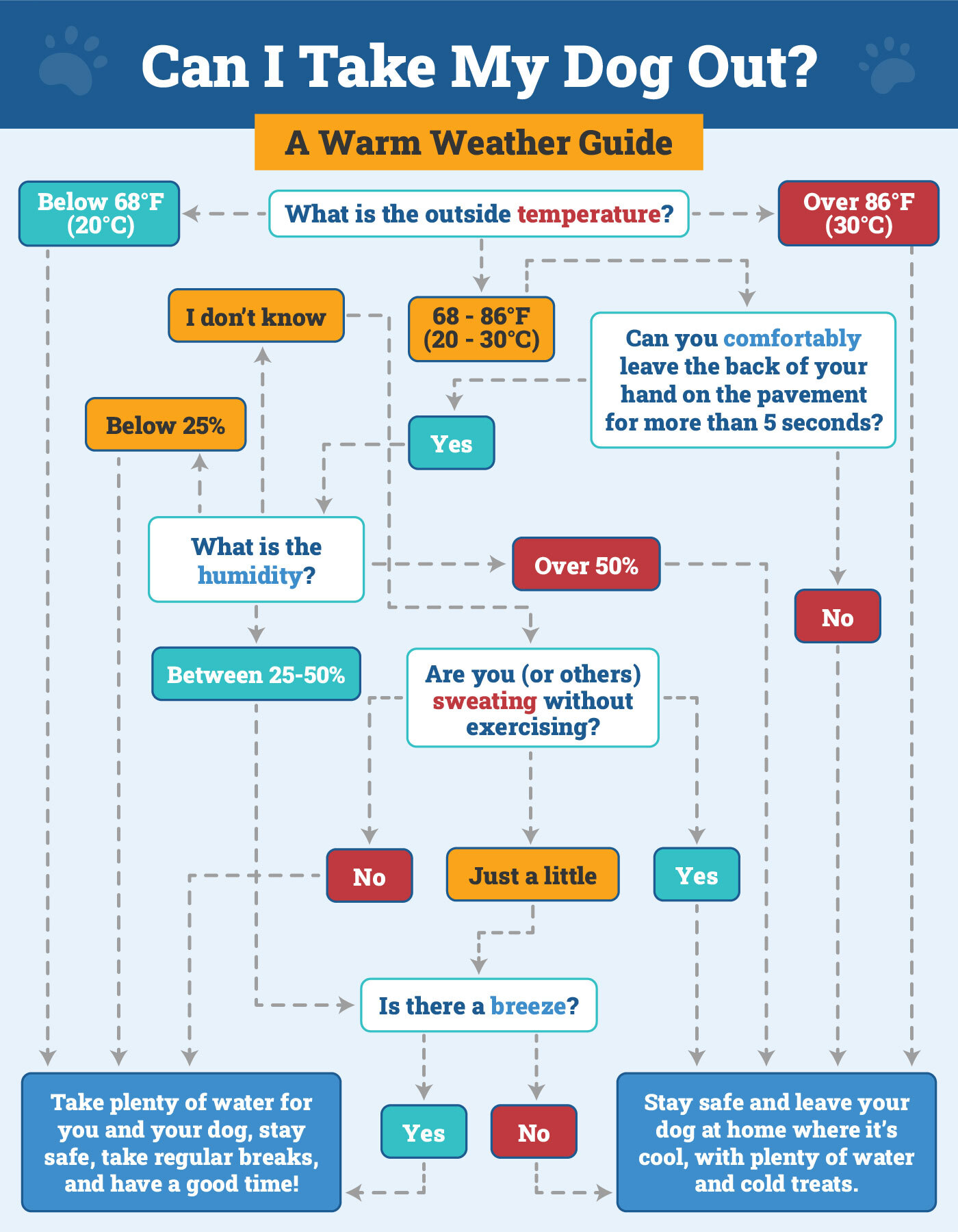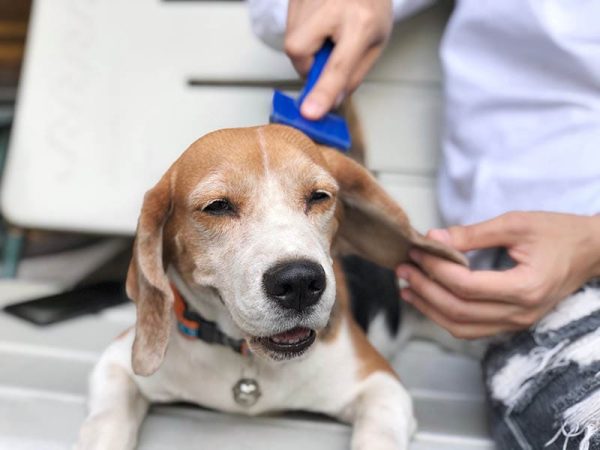When the scorching summer temperatures roll around, the heat can take a toll on your dog if they are unable to cool down effectively. The heat is not only uncomfortable for dogs but puts them at risk of heat-related illnesses too. Heatstroke is an example of a severe condition that can be fatal to dogs, hence why keeping them cool on hot days is essential.
You might think that your canine is perfectly okay in hot weather because they can pant to cool down. Although this is true to a certain extent, panting alone won’t cool down your dog enough to prevent heat-related illnesses, especially if they don’t have access to somewhere where they will be out of the heat.
It’s your responsibility as a dog owner to give them safe options to cool themselves down. So, keep reading to find out 10 effective tips to cool down your hot dog.

Warm Weather Guide to Taking Your Dog Outside

The 10 Tips for Cooling Down Your Dog
1. Hose Them with Cool Water
The best way to quickly cool down your dog in unfavorably hot temperatures is to hose them with cool water. This method works best for dogs who are not afraid of water or the hose pipe. Of course, you do not want to jet spray your dog with the hose, so use the misting or shower setting instead.
Most water-loving dogs will enjoy the coolness of the water and perhaps make a game out of it too. Alternatively, you could also let your dog play in the sprinklers and get wet themselves.
2. Drape a Damp Towel Over Them
If your dog has found a cool spot to lay down and rest, you could drape a damp towel over them. This method works well if you have the fan blowing a gentle breeze around the house and over the damp towel.
The damp towel does not need to cover your entire dog, as it might defeat the purpose of cooling them down. Instead, drape the damp towel over their belly or backs and let the fan blow over it. All you need to do is run a towel under cool water and wring it out, so it is not dripping anymore. Make sure that the towel is removed once it is no longer cool because otherwise it will trap the heat and do more harm than good.

3. Place Their Sleeping Area in the Shade
If your dog’s bed or kennel is in a sunny area, it should be moved to complete shade. Kennels can get extremely warm inside on hot days, particularly if they aren’t in the shade. If your dog is confined to a kennel, ensure this kennel is moved to the shade. If there are no shaded areas outside, you should allow your dog to rest indoors during hot days.
4. Add Ice Cubes to Their Water
It is essential to keep your dog hydrated in the heat. They should always have access to fresh water. You should leave multiple water bowls around the home and outdoors for your dog on hot days. The water should be placed in shady areas and frequently replenished. Adding a few ice blocks into their water and allowing it to melt before letting your dog drink it can help keep them cool. You don’t want to give them frozen water, but ideally a bit cooler than room temperature.

5. Freeze Their Toys
If your dog has solid, freezable toys, place them in the freezer for a few hours and let your dog chew them on hot days. Some examples of freezable dog toys include the Kong Extreme Dog toy and the PetSafe Chilly Penguin.
6. Put a Fan or Aircon On
Running a fan or air conditioner in the home can create a cool environment for your dog on those hot days. The air conditioner should be set to a comfortable temperature and doesn’t need to blow freezing air to cool your dog down effectively. A temperature of about 68° to 74° Fahrenheit (20°C to 23°C) is an appropriate setting for the air conditioner.
You want to focus on running the air conditioner to cool down the room and not let it blast directly over your dog. The same applies to a fan, which should blow cool air around the room and not primarily on your dog. Some dogs might find the fan irritating if it blows directly over them, so keep it on the rotating setting.

7. Mist the Tiles
Most dogs are drawn to the cool feel of tiled flooring on hot days. The tiles feel cool on their exposed belly as their usual bed or blanket might be too hot for them. To make the tiles even cooler for your dog, you could mist the section of the tiles that your dog prefers with cool water. You could also mist their belly and inner thighs with cool water while they are lying on the tiles and allow a fan to blow a gentle breeze around.
8. Avoid Taking Them for a Midday Walk
Taking your dog for a midday walk in the heat can be dangerous. Not only do the hot temperatures put your dog at risk of heatstroke, but the pavement or sand is likely too hot for their paws to handle. You should take your dog for a walk in the early mornings or late evenings when the temperatures are more favorable.
Always do the hand test to ensure that the ground your dog is walking on is not too hot. Place the back of your hand on the ground for about 10 seconds. If your hand feels like it’s burning (even a little bit) from the heat or you want to reflexively remove it, then it is too hot for your dog. This doesn’t only apply to asphalt, but to sand and artificial turf too.

9. Fill Up a Shallow Kiddies Pool
If you have a water-loving canine, then allowing them to play in a shallow kiddies pool can be an effective way to cool them down. The kiddie’s pool does not need to be filled up all the way, as the water line should just cover your dog’s paws.
The sides of the pool should be low enough for your dog to easily get in and out. The water does not need to be freezing, so cool or tepid water will suffice. Ensure that your dog has access to the pool with your supervision and empty it when you aren’t able to watch them. Place the kiddie’s pool in a shaded area if you set it up outdoors.
10. Give Them Frozen Treats
Yummy, frozen treats can be great for your dog on hot days. They will help keep your dog cool while giving them something fun to do. There are numerous frozen dog treat recipes available online that can be made at home and with ingredients that are budget-friendly.
Some popular options include pup-sicles and doggy ice cream. Most of the recipes allow you to tailor the ingredients to your dog’s liking, but you should still ensure all the ingredients are safe.

Conclusion
You can help your dog beat the heat with the effective cooling tips mentioned in this article. Keep in mind that these tips are not to be used for dogs currently suffering from heatstroke. They should only be used as a preventative measure to keep your dog cool and not to treat health problems that require veterinarian intervention.
If you suspect your dog has heatstroke, they should be taken to a cool, shady area with plenty of ventilation. You should then contact an emergency veterinarian for further advice.
Did you know you can speak to a veterinarian without having to travel? Just head over to PangoVet. It's our online service where you can talk to a vet online and get the advice you need for your pet — all at an affordable price!

See also:
- Why Does My Dog Feel Hot to the Touch? Our Vet Discusses 5 Possible Reasons
- Can a Dog Recover From a Stroke? Vet Approved Signs, Causes & Treatment
Featured Image Credit: FamVeld, Shutterstock


















